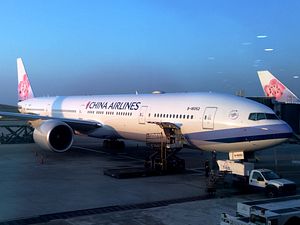“Is the crew bound for Singapore tonight present?” a woman’s voice, magnified many times, shouted into the night. Shrill screams of affirmation met her question. It was 12 am and hundreds of China Airlines employees were camped out in front of the company’s headquarters in downtown Taipei.
The first-ever airline crew strike in Taiwan had begun.
Dissent has been festering for many years and only in the recent months did some of the crew members begin to speak up through China Airlines’ union. The company was blamed for extremely long work hours, low pay on holiday shifts, and various changes China Airlines has made over the years that the crew claimed affected their rights as employees.
“Reverse laborer-capital relations!” the crew members chanted, sitting on the sidewalk. In a crew-only vote conducted by China Airlines’ union, 2,535 out of 2,638 members voted in support of the strike – a whopping 96 percent. Most bore signs that read “Crew members on strike, must succeed!” and “Strike not arbitration!”
China Airlines has announced that, as of press time, eight flights will not be flying on June 24. The destinations include Hong Kong, Incheon, Manila, and Fukuoka, and an estimated 1,590 passengers will be affected by the changes.
The union is planning to take possession of 1,500 crew members’ passports and mainland travel permits, in order to ensure the members stick to their decision to go on strike, announced union spokeswoman Huang Huei-cheng. Those who do not cooperate will be removed from the union, said Huang. “As for how long the strike will last, it would depend on when China Airlines decides to revert back to the hourly wage rates and duty-reporting rules that were in use before June 1… We will negotiate with the company then.”
Huang is referring to another major reason for the strike: before June 1, the crew would report for duty in Taipei, and the clock-in hours that their hourly wages were based on would begin in Taipei. The new policy calls for crew members to report for duty in Taoyuan, where the international airport is located, and the clock-in hours would begin only after the hour-long bus ride from Taipei to Taoyuan was over.
According to Taiwan’s Act for Settlement of Labor-Management Disputes, strikes may legally begin once industrial negotiations fail to reach a compromise and over half of the union workers voted in favor of a strike.
China Airlines is one of the major airlines founded in Taiwan, and the first to hold a strike in the island’s aviation history. The airline’s main competitor, EVA Air, has bound its crew members to an agreement that no union should be formed.

































